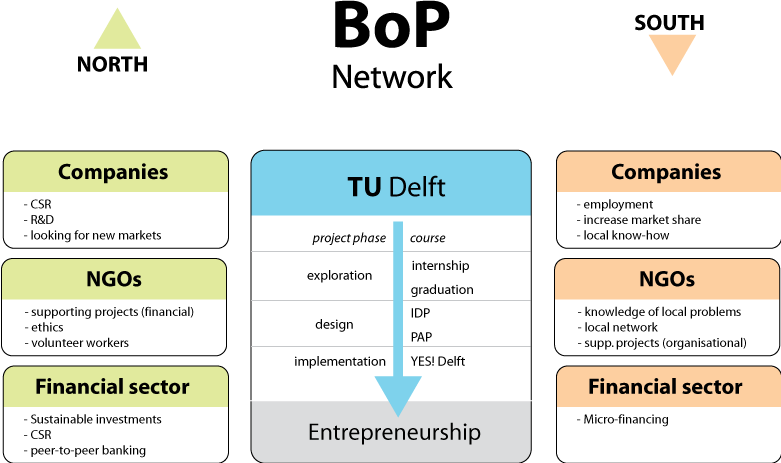Network
From Bop
Contents |
goal
features
first model
Stakeholders
TU Delft
courses of relevance: Internacionalization (ID4050)
Bachelor
Minor International entrepreneurship and development
- Social Entrepreneurship (WM0565TU, Esther Blom)
- Awareness of Cultural Differences (SPM9237, Martin de Jong)
- Technology and Global Development (WM0902TU, Wim Ravensteijn)
- Collaborative Business Design (IO3813, Frido Smulders)
- History of Technology (WM0401TU, Wim Ravensteijn)
- Casestudy International Entrepreneurship & Development (WM0564TU, Esther Blom )
Electives
- History of Technology & Technology and Global Development (WM0930TU, Wim Ravensteijn)
- Communicative interaction: Moral aspects of teamwork (WM0306TU, Otto Kroesen)
- Intercultural internship (WM0927TU, Otto Kroesen)
- De onderneming in sociologisch perspectief (WM0404TU)
- Duurzaam ondernemen (WM0915TN)
- Product Development en Innovatie(IO3803)
- Communicative Interaction (WM0306TU)
- Innovatiemanagement (WM0625TU)
- Civiele Techniek in ontwikkelingssamenwerking (CT5560)
- De essentie van technologisch Ondernemersschap (WM0560TU)
- Finance for Entrepreneurs (WB3482)
- Managing Start-ups (WM0926TU)
- Introduction to business marketing (IO3806)
Master
IDP / PAP / Graduation Project / Internship
- Internationalisation (ID4250)
Students
Students for Sustainability
Survey among students interested in BoP
NGOs
First of all is important define the concept of non-governmental organization (NGO), we are using two different definitions. The first concept following the United Nations Organization (UN) definition and the other address the general concept.
According to the United Nations Organization, a Non Governmental Organization is: “is a not-for-profit, voluntary citizens’ group, which is organized on a local, national or international level to address issues in support of the public good. Task-oriented and made up of people with common interests, NGOs perform a variety of services and humanitarian functions, bring citizens’ concerns to governments, monitor policy and programme implementation, and encourage participation of civil society stakeholders at the community level. They provide analysis and expertise, serve as early warning mechanisms, and help monitor and implement international agreements. Some are organized around specific issues, such as human rights, the environment or health. Their relationship with offices and agencies of the United Nations (UN) system differs depending on their location and their mandate.” http://www.un.org/dpi/ngosection/criteria.asp
And Following Wikipedia, NGO is: “a legally constituted organization created by private persons or organizations with no participation or representation of any government. In the cases in which NGOs are funded totally or partially by governments, the NGO maintains its non-governmental status insofar as it excludes government representatives from membership in the organization.” http://en.wikipedia.org/wiki/NGO
Cordaid
Relation Management
Wanted: a partner for a long-standing relationship, with this appeal, the Relation Management Department started a number of activities to strengthen the co-operation with Dutch educational institutions, capital funds, foundations, companies, service clubs and financial institutions. This co-operation is important, because poverty and injustice can only be fought with joint efforts. Especially innovative types of co-operation are sought, while the use of expertise and influence are at least as important as income acquisition. The last mentioned is obviously not unimportant either, as a result of which the fund-raising efforts of the Relation Management Department in 2006 have resulted in proceeds of 6.6 million due to contributions from companies, capital funds, educational institutions, ecclesiastical institutions and service clubs.
source: Cordaid Annual report 2006 (download here)
Avina
Ashoko
Bid-network
Companies
Consultancies
Governmental Organisations
NCDO
Financial Sector
peer-to-peer banking
Triodos Bank
The Triodos Bank fynances compagnies, institutions and project with an added value in the field of social, enviroment and cultural. For this the bank uses money from savers and investors who chose to invest in a social and durable concern.
Mission • Being part of a society in which the living standart is raised and human value is the main focus. • They want to provide people , companies and organisations to make conscious use of their money and promote durable developments • Giving their clients a durable financial product and good service.
Fair Share Fund A private investment option, which invests in local entrepreneurs in developing countries. Fair Share Fund helps people in Central-Asia and Eastern-Europe to start their own business or expand their business.
http://www.triodos.nl/nl/personal_banking/investments/investment_types/43502/
Terrafina Microfinance
A micro fynancing program of the ICCO, Oikocredit and Rabobank Foundation. They are active worldwide. They don’t provide micro credits themselves. They support young local credit organisations in their starting phase with allowances and advise. More experienced organisations get loans to expand their activities. These organisations do provide micro credits. Terrafina Microfinance only operates in Africa.
http://www.terrafina.nl/en/index.phtml?p=Vraag+en+antwoord
AMSA
Argentina Microfinanzas S.A. (AMSA) is a start-up microfinance institution set up by an experienced management team with good loans methodology and a solid business plan.
http://www.triodos.com/com/who_we_finance/funds/triodos_doen_foundation/latin_america/207900
The foundation Triodos-Doen
Is a coorporation between the Triodos Bank and the DOEN foundation. Their goal is to stimulate project which concern durable developments in developing countries. The foundation Triodos-Doen focusses on MFI’s and fair trade organisations and biological products with a fair trade label.
http://www.doen.nl/web/show/id=44589
FIS
FIS is the second largest MFI in Argentina. In addition to loans, it provides solar panels to families living in zones where there is no commercial electricity.
http://www.socialedge.org/blogs/global-x/topics/Argentina
RADIM Red Argentina de instituciones de Microcrédito
Aims
• To give support and to strengthen the professionalization of Human resources of the IMF partners. • To generate compromised Human Resources to institutions, to offer services of high quality to the people for those who work for.
Services
• To achieve the mentioned aims it is planed to implement different actions and intervention methodologies:
• Thematic trainings integrating several IMF (Seminars, Workshops, courses, etc.) • Specializing trainings at field in every IMF (from demand) • Internship Programme between the IMF. • Services of technical assistance to the IMF. • Training actions at distance (Internet and systems of videoconference) • Events of training on microfinance, national and international.
http://www.reddemicrocredito.org/eng/servicios.asp
Kiva
Mission: connecting people through lending for the sake of alleviating poverty
Kiva empowers individuals to lend directly to entrepreneurs in the developing world. They work together with existing expert microfinance institutions.

